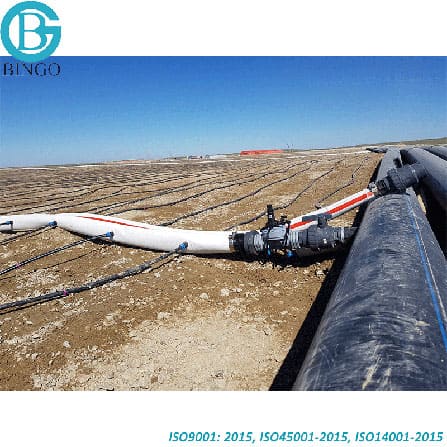Why Pipe Supplier American Plastics Midland Is the Top Choice for Contractors
Understanding the Trick Conveniences of HDPE Pipeline for Water and Wastewater Monitoring
Using HDPE pipeline in water and wastewater administration presents many benefits that merit consideration. Its outstanding durability and lengthy lifespan make it a recommended option for many projects. Furthermore, the material's resistance to rust and chemical damage enhances its integrity in various atmospheres. The benefits extend beyond just durability and resistance. Texas hdpe pipe manufacturer. Exploring its cost-effectiveness and ecological influence reveals much more compelling reasons for its widespread adoption in modern facilities
Outstanding Sturdiness and Long Life

HDPE pipeline stands apart for its phenomenal toughness and long life, making it a favored option in water management systems. Constructed from high-density polyethylene, these pipes can endure considerable stress and tension, ensuring dependable efficiency with time. Their robust nature permits them to endure severe environmental conditions, including temperature level fluctuations and soil motions, which can create other products to fall short.
The life-span of HDPE pipes often exceeds 50 years, offering a cost-effective solution for towns and sectors alike. Furthermore, the material's light-weight properties streamline installation, minimizing labor expenses and durations. This longevity minimizes the demand for constant repairs or substitutes, additionally improving its financial charm.
In water management applications, the reliability of HDPE pipelines indicates less disruptions and enhanced solution connection, making them integral to lasting infrastructure growth. The combination of toughness and durability strengthens HDPE's function as a keystone in efficient water monitoring remedies.

Resistance to Rust and Chemical Damage
While several materials catch deterioration and chemical damage gradually, HDPE pipes display amazing resistance, making them suitable for different water monitoring applications. This durability stems from the molecular structure of high-density polyethylene, which is naturally non-reactive and does not corrode like steels or break down from exposure to severe chemicals. Because of this, HDPE is extremely efficient in environments with aggressive substances, such as wastewater systems that may include acids, bases, and natural solvents.
Additionally, HDPE pipelines can hold up against environmental elements such as dirt level of acidity and saline problems, better improving their viability for diverse applications (American Plastics HDPE Pipe for Oilfield). Their capacity to keep structural stability over time minimizes the danger of leaks and failings, which is critical in making certain the safety and reliability of water circulation and wastewater management systems. As a result, the resistance to corrosion and chemical damage markedly adds to the overall effectiveness and long life of HDPE piping solutions
Cost-Effectiveness and Financial Benefits
When thinking about the economic effects of water management systems, the cost-effectiveness of HDPE pipes ends up being apparent. These pipes supply lower installation and upkeep expenses contrasted to typical materials like steel or concrete. Their lightweight nature simplifies transport and setup, resulting in reduced labor expenditures. Additionally, HDPE pipelines exhibit a lengthy lifespan, typically going beyond check my blog 50 years, which translates to fewer replacements and long-term cost savings.
The resistance of HDPE to corrosion and chemical damage minimizes the requirement for expensive repair work and substitutes. The pipelines likewise support reliable water circulation, reducing energy prices associated with pumping systems. By minimizing leaks and water loss, HDPE pipes contribute to significant financial benefits for communities and sectors alike. In general, the initial financial investment in HDPE piping can yield significant financial returns over the lifespan of the water administration system, making it a prudent selection for lasting facilities advancement.
Ecological Sustainability and Lowered Effect

Versatility and Flexibility in Setup
As a result of their special buildings, HDPE pipelines use impressive adaptability and adaptability in setup, making them suitable for a large array of applications. Their light-weight nature permits for less complicated handling and transportation, lowering labor prices and installation time. HDPE pipelines can be curved and shaped to fit various surfaces and project needs, which is particularly valuable in testing environments.
Additionally, their resistance to rust and chemical damages permits installation in diverse settings without the need for specialized protective coatings. The capability to fuse joints produces a continual, leak-free system, boosting the overall integrity and dependability of the installation. HDPE's adaptability likewise accommodates ground activity, lowering the danger of damage in areas susceptible to moving soil. In general, these characteristics make HDPE pipes not just versatile yet likewise a favored option for water and wastewater management systems.
Frequently Asked Concerns
Exactly How Does HDPE Pipeline Compare to PVC in Water Management Applications?
HDPE pipe supplies remarkable versatility, resistance to rust, and longevity compared to PVC. Its lighter weight helps with much easier installation, while its long life expectancy reduces substitute prices, making HDPE a favored choice in water management applications.
What Is the Lifespan of HDPE Pipeline Under Regular Problems?
Under regular conditions, HDPE pipelines can have a life-span varying from 50 to 100 years. Their longevity and resistance to corrosion add to their long-term performance in various applications, making them a trusted option for infrastructure.
Are HDPE Water Lines Recyclable After Their Life Span?
Yes, HDPE pipes are recyclable after their life span. American Plastics HDPE Pipe for Oilfield. They can the original source be processed and repurposed into new items, substantially lowering ecological influence and advertising sustainability within the market, making them an environmentally friendly selection for piping services
What Is the Installment Refine for HDPE Piping?
The installment procedure for HDPE pipelines involves site preparation, trenching, pipeline fusion or mechanical joining, backfilling, and pressure screening. Proper strategies guarantee a long lasting and effective system for transporting water and wastewater efficiently.
Can HDPE Pipeline Be Used for Both Potable and Non-Potable Water Systems?
Yes, HDPE pipes can be used for both safe and clean and non-potable water supply. Their adaptability, sturdiness, and resistance to deterioration make them suitable for different applications, guaranteeing risk-free and reliable transportation of water in different contexts.